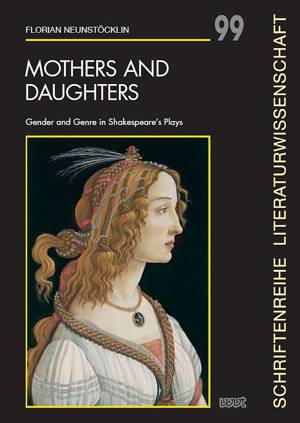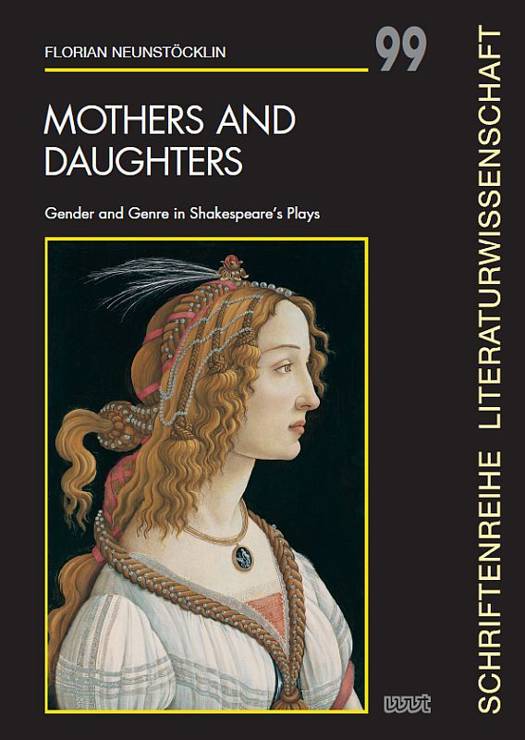
- Retrait gratuit dans votre magasin Club
- 7.000.000 titres dans notre catalogue
- Payer en toute sécurité
- Toujours un magasin près de chez vous
- Retrait gratuit dans votre magasin Club
- 7.000.000 titres dans notre catalogue
- Payer en toute sécurité
- Toujours un magasin près de chez vous
34,45 €
+ 68 points
Description
Throughout his career, Shakespeare invented a plethora of maternal characters. In his plays one can find compliant patriarchal wives next to rebellious and misandrous widows, motherly friends and confidantes alongside evil stepmothers, and there are pregnant mothers who are separated from their child immediately after birth. Because of this great interest in different aspects of motherhood, it is striking that Shakespeare's plays so rarely depict the family relationship between a mother and her biological daughter. Mother-daughter relationships are not only marginalized within Shakespeare's dramatic oeuvre in general, but also within the plots of the six plays where they actually do appear.This analysis brings together close readings ranging from Shakespeare's earlier plays Romeo and Juliet, Henry V, and The Merry Wives of Windsor to the late tragicomedies Pericles and The Winter's Tale in order to show that the highly different and contrasting types of motherhood have strong repercussions on the (im)possibilities of imagining and staging mother-daughter relationships within the different genres of Shakespearean drama. The study is informed by an interdisciplinary approach that links Shakespeare and feminist criticism with psycho-analysis and gender and genre studies.
CONTENTS
Chapter 1: Introduction1
1.1 Mothers and Daughters3
1.2 Gender10
1.3 Genre19
Chapter 2: Patriarchal wives and future brides: the rare mother-daughter bond in Shakespeare's early plays24
2.1 "I have done with thee." - Lady Capulet and Juliet's destructive relationship in Romeo and Juliet27
2.1.1Tragedy of love and family tragedy28
2.1.2Collective identity vs. individual identity31
2.1.3Lady Capulet and Juliet35
2.1.4The Nurse as a comic ersatz mother39
2.1.5Lady Capulet and the Nurse as grieving mothers42
2.2 "No woman shall succeed in Salic land" - Female genealogy and male history-making in Henry V44
2.2.1War, politics, and patriotism: history as a 'male genre'?45
2.2.2The female characters in Henry V47
2.2.3England's 'indirect' Salic law and the female blood-line48
2.2.4Intimacy and inwardness: Alice as Catherine's private confidante50
2.2.5Marriage policy and raison d'état: Queen Isabel as a public figure52
2.2.6Catherine of Valois and the refusal to accept maternal ancestry57
2.3 "Good mother, do not marry me to yon fool." - Mistress and Anne Page's far-cical disagreement in The Merry Wives of Windsor60
2.3.1Anne Page and her three unequal marriage candidates63
2.3.2Parental union in farcical disagreement: Master and Mistress Page65
2.3.3Anne's marriage with Fenton68
2.3.4The transformative powers of the middle class71
2.4 "I am a mother to you" - Adoption and the problem of incest in All's Well That Ends Well72
2.4.1Helen as an unorthodox heroine74
2.4.2Bertram's Oedipal complex76
2.4.3Helen and the Countess79
2.4.4The Widow of Florence and Diana82
2.4.5Bertram and Helen's return to Roussillon83
Chapter 3: The 'absent presence' of the great tragedies: daughterless mothers and motherless daughters87
3.1 "Bring forth men-children only" - Lady Macbeth as an ambivalent anti-mother89
3.1.1The confusion of gender roles in Macbeth89
3.1.2Witchcraft and maternity: the weird sisters as satanic anti-mothers91
3.1.3Hysteric, witch, and female psychopath: Lady Macbeth's fatal alliance94
3.1.4Lady Macduff as the quintessential patriarchal victim99
3.1.5Dissolution of maternal power and restoration of male order100
3.2 "O my mother, mother, O!" Volumnia as a dominant super-mother in Coriolanus104
3.2.1
CONTENTS
Chapter 1: Introduction1
1.1 Mothers and Daughters3
1.2 Gender10
1.3 Genre19
Chapter 2: Patriarchal wives and future brides: the rare mother-daughter bond in Shakespeare's early plays24
2.1 "I have done with thee." - Lady Capulet and Juliet's destructive relationship in Romeo and Juliet27
2.1.1Tragedy of love and family tragedy28
2.1.2Collective identity vs. individual identity31
2.1.3Lady Capulet and Juliet35
2.1.4The Nurse as a comic ersatz mother39
2.1.5Lady Capulet and the Nurse as grieving mothers42
2.2 "No woman shall succeed in Salic land" - Female genealogy and male history-making in Henry V44
2.2.1War, politics, and patriotism: history as a 'male genre'?45
2.2.2The female characters in Henry V47
2.2.3England's 'indirect' Salic law and the female blood-line48
2.2.4Intimacy and inwardness: Alice as Catherine's private confidante50
2.2.5Marriage policy and raison d'état: Queen Isabel as a public figure52
2.2.6Catherine of Valois and the refusal to accept maternal ancestry57
2.3 "Good mother, do not marry me to yon fool." - Mistress and Anne Page's far-cical disagreement in The Merry Wives of Windsor60
2.3.1Anne Page and her three unequal marriage candidates63
2.3.2Parental union in farcical disagreement: Master and Mistress Page65
2.3.3Anne's marriage with Fenton68
2.3.4The transformative powers of the middle class71
2.4 "I am a mother to you" - Adoption and the problem of incest in All's Well That Ends Well72
2.4.1Helen as an unorthodox heroine74
2.4.2Bertram's Oedipal complex76
2.4.3Helen and the Countess79
2.4.4The Widow of Florence and Diana82
2.4.5Bertram and Helen's return to Roussillon83
Chapter 3: The 'absent presence' of the great tragedies: daughterless mothers and motherless daughters87
3.1 "Bring forth men-children only" - Lady Macbeth as an ambivalent anti-mother89
3.1.1The confusion of gender roles in Macbeth89
3.1.2Witchcraft and maternity: the weird sisters as satanic anti-mothers91
3.1.3Hysteric, witch, and female psychopath: Lady Macbeth's fatal alliance94
3.1.4Lady Macduff as the quintessential patriarchal victim99
3.1.5Dissolution of maternal power and restoration of male order100
3.2 "O my mother, mother, O!" Volumnia as a dominant super-mother in Coriolanus104
3.2.1
Spécifications
Parties prenantes
- Auteur(s) :
- Editeur:
Contenu
- Nombre de pages :
- 262
- Langue:
- Anglais
- Collection :
- Tome:
- n° 99
Caractéristiques
- EAN:
- 9783868219838
- Format:
- Livre broché
- Dimensions :
- 150 mm x 7 mm
- Poids :
- 433 g







